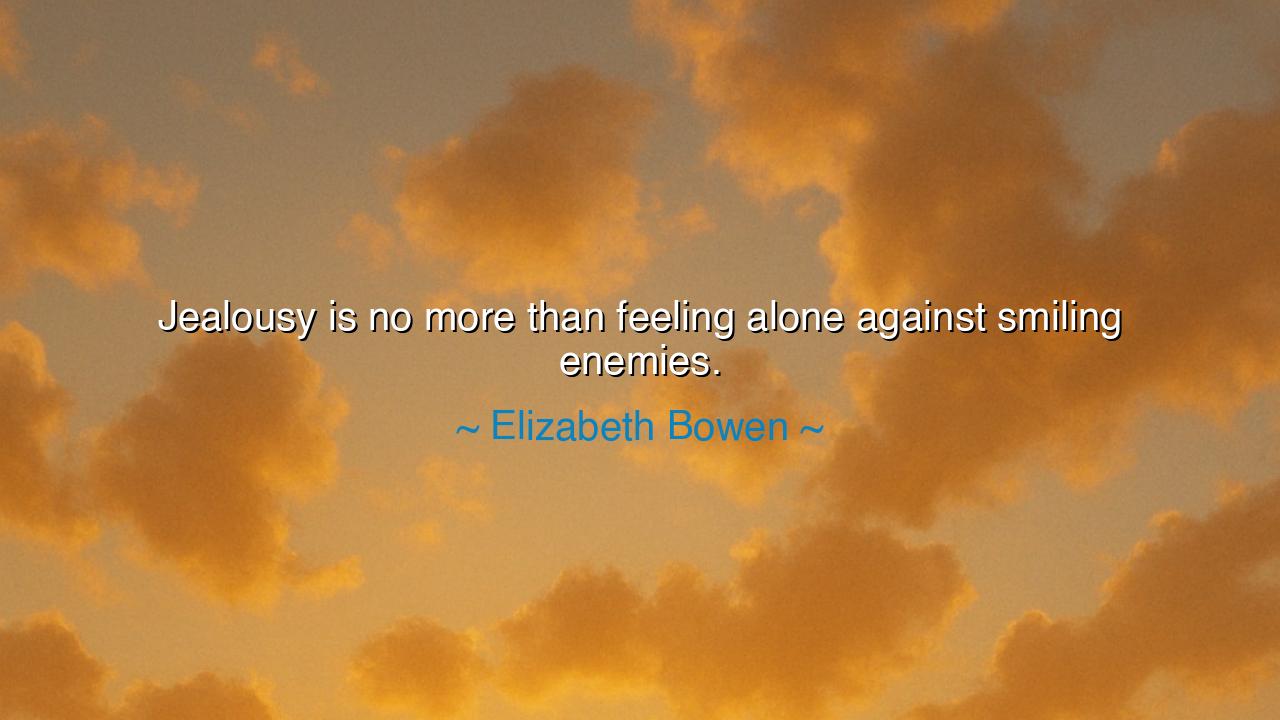
Jealousy is no more than feeling alone against smiling enemies.






"Jealousy is no more than feeling alone against smiling enemies." These profound words by Elizabeth Bowen speak to the essence of a human emotion that has plagued the hearts of men and women for millennia—jealousy. Bowen’s insight reveals the heart of this feeling: jealousy is born from isolation and insecurity, a state where one feels alone in the presence of others who, while seemingly friendly, are secretly rivals. The smiling enemies, those who appear kind yet harbor ill will or are simply in competition, create a sense of betrayal in the soul. The jealous person is trapped, not just in their own emotions, but in the feeling that the world is against them, and that they stand alone in their suffering.
The ancient philosophers understood the destructive nature of jealousy, for it was seen as an affliction that eats away at the soul, clouding reason and turning the mind against others. Aristotle regarded jealousy as a vice that stems from self-doubt, for a person who does not feel secure in their own worth is easily threatened by the success or happiness of others. Plato, in his writings, often suggested that jealousy arises from the perception that something we desire—whether love, status, or wealth—has been claimed by another. To overcome jealousy, he argued, was to master the self, to understand that the universe is abundant and that no one’s success diminishes another’s potential. The key to peace lies in the ability to celebrate the prosperity of others without feeling threatened by it.
The story of Cain and Abel in the Old Testament provides a vivid illustration of jealousy’s destructive power. Cain, feeling overlooked and rejected by God in favor of his brother Abel, allowed his jealousy to fester and grow. In his isolation—both from his brother and from his own inner peace—Cain ultimately murdered Abel. His jealousy, driven by the perception that his brother’s favor with God diminished his own worth, led him to commit an irreversible crime. This ancient tale serves as a stark reminder that when jealousy takes hold of the heart, it does not just destroy relationships; it destroys the individual from within. Jealousy, like a poison, can blind us to the abundance of life and love that surrounds us.
In the modern world, we often see jealousy manifest in the form of rivalries—whether in the workplace, in relationships, or in the pursuit of social standing. Think of the political rivalries that emerge when one leader’s popularity threatens the position of another. Leaders like Julius Caesar and Pompey the Great—once allies in the rise of the Roman Republic—fell into bitter rivalry, driven in part by jealousy. While outwardly they seemed to work together, their smiles masked the deeper animosity they each felt. Ultimately, their jealousy and mistrust toward each other led to civil war and the eventual downfall of the Republic. Caesar, once beloved by the people, was struck down by those who were his closest allies—betrayed by the very envy that had taken root among them.
Bowen’s insight is a reminder that jealousy arises not from the externals, but from the internal state of the individual. To feel alone against smiling enemies is to be trapped in a mindset that sees others not as fellow travelers in the journey of life, but as competitors or threats. The jealous heart believes there is a limited amount of happiness or success, and that to allow others to rise means their own descent. This mindset denies the truth of abundance in the world, for in reality, there is enough space for all to thrive. Just as the sun does not compete with itself, but simply shines, so too should we learn to shine without fear of another's light.
The lesson to be learned here is not just about overcoming jealousy, but about transforming our perspective on competition and success. In the words of Ralph Waldo Emerson, "What is success? To laugh often and much; to win the respect of intelligent people and the affection of children; to earn the appreciation of honest critics and endure the betrayal of false friends; to appreciate beauty; to find the best in others; to leave the world a bit better, whether by a healthy child, a garden patch, or a redeemed social condition." To conquer jealousy is to embrace cooperation and support for others, understanding that their success is not a threat to our own but an affirmation of what is possible.
In our own lives, let us strive to recognize and transform jealousy when it arises. Rather than feeling threatened by others’ happiness or achievements, let us celebrate them, understanding that the joy of one person does not diminish the potential for our own joy. We must free ourselves from the prison of comparison and competition and see others as fellow travelers in this shared journey of life. Look inward, recognize your own value, and build your self-worth on the knowledge that you are enough. By doing so, we break free from the chains of jealousy and step into a life of abundance, gratitude, and mutual support. For in embracing the success of others, we find the true richness of life—the realization that we are never alone in our journey, and that there is enough space for all to thrive.






AAdministratorAdministrator
Welcome, honored guests. Please leave a comment, we will respond soon